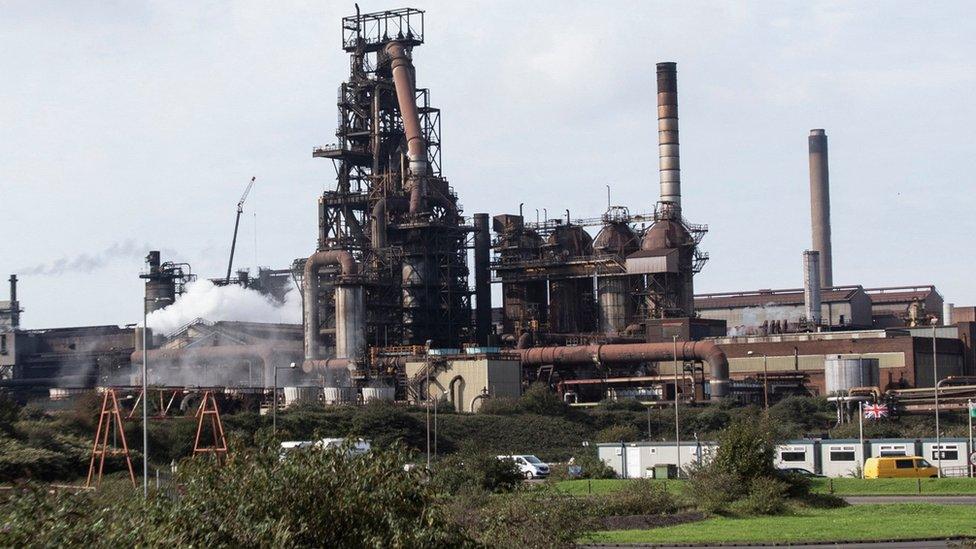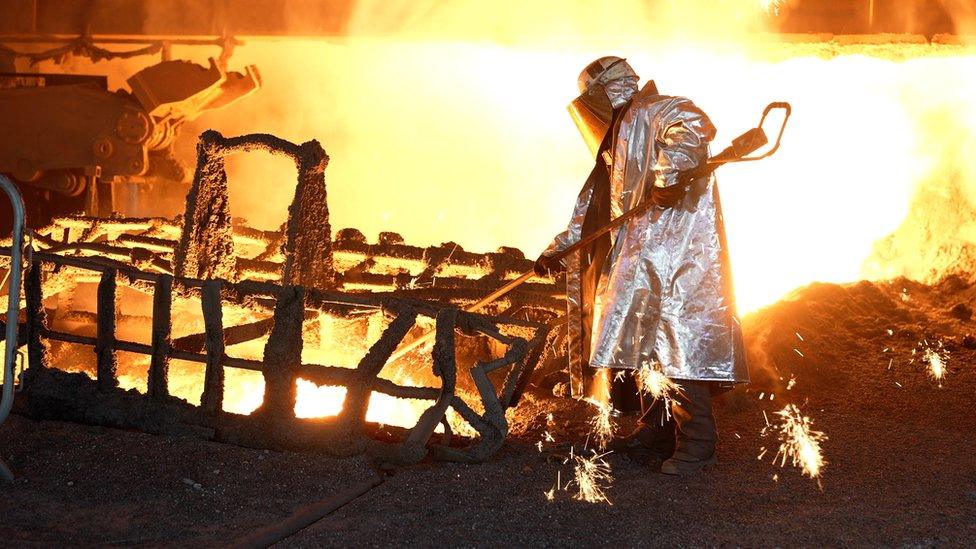Tata Steel: Unions infighting grows ahead of jobs meeting
- Published

Infighting by unions is jeopardising attempts to save thousands of steel making jobs, the BBC has been told.
The UK's largest steel plant at Port Talbot is facing 3,000 job cuts under plans being considered by owner Tata.
There is a deep rift with Community and GMB on one side and Unite on the other, which has withdrawn its support for a cross-union approach to talks.
It is understood Community, the largest steel union, has invited Unite leaders to meet next week to resolve divisions.
Last month, all unions were told by Tata, the owners of Port Talbot, that the company planned to close both blast furnaces at the south Wales site, and build a less energy emitting - and labour intensive - Electric Arc Furnace (EAF) over the next three years.
While plans to manufacture steel in a greener way were announced, the Indian company conceded the move would result in the loss of between 2,500 and 3,000 jobs.
Unions appeared united in the fight to prevent job losses following Tata's announcement, but a major rift between them has now become bitter, with senior officials at Community and GMB - and even some members of Unite - describing Unite's position as "reckless".
Sharon Graham, Unite's general secretary, was singled out as having an "unrealistic" approach to the dispute, but a spokesperson for the union hit back saying the leader's "record speaks for itself".
"We are a trade union and will make no apology for acting like one," they said.
"Whilst many seem to be resorting to attacks from the sidelines and supporting managed decline, Unite has a real plan for the growth of the steel industry."
The infighting between union officials first emerged and battle lines were drawn when the GMB, Community, and Unite all responded to Tata's plans with joint proposals, prepared by consultants Syndex. Community is the steel industry's largest union representing around two thirds of workers, while Unite represents less than a third.
All three unions originally suggested that closing the oldest blast furnace, but keeping the younger one active until 2032 while the small EAF is built, would preserve 2,300 jobs and would require few compulsory redundancies.
But Unite withdrew its support for the plan and has insisted on no redundancies at all, arguing both blast furnaces at the site could be kept open indefinitely while a larger EAF is constructed.
Unite's plan has not yet been formally presented to steelworkers and Community and GMB reps described some unusual lengths Unite has gone to in order to keep its plan under wraps.
At a Unite meeting in November in a social club, attendees were asked to hand in their phones and were not allowed to take a copy of the plan away from the meeting.
'Unrealistic'
The rift has become bitter with senior officials at Community and GMB describing the Unite position as "unrealistic" and "in really bad faith". Insiders at Community told the BBC they had "implored" the Unite leadership to fall back in behind a plan developed by the industry analysts Syndex.
People familiar with Tata's position are also understood to not be seriously considering the Unite proposal as it has yet to be presented through the National Steel Committee - the usual forum for plans to be shared.
A meeting is set to take place soon where Unite is expected to present its proposal, but other union reps have told the BBC there is "no chance" the Unite proposals will be adopted as the main negotiating position.
Unite's Ms Graham said her union's plan for Port Talbot would "ensure jobs are created not lost, provide a bright future for South Wales, and guarantee the UK as a global leader in green steel production".
"As the country and the world transition to net zero, the demand for steel is growing - especially low carbon steel," she said.
"So the question is not whether we will be using more steel - simply where it is going to be made. If Tata and the government continue on their current course, it will leave us in the ridiculous situation of needing more steel while we run down our own capacity to make it."
Tata has said its UK operations are losing over £1m a day.
The BBC understands talks between the government and the Indian conglomerate are ongoing but that a support package of around £500m is conditional on the funds being spent on investment in decarbonisation, rather than subsidising or compensating the company for ongoing losses.

One thing the warring unions do agree on is that Tata's plans would not only see up to 3,000 jobs lost, but would also require the UK to import the newly made - or "virgin steel" - from overseas until an EAF was up and running.
That would mean importing steel made in more carbon-intensive ways - and with more carbon emissions through shipping costs - than using UK-made steel.
It is widely acknowledged that EAFs cannot produce what is termed as "virgin steel", but then can make the vast majority of steel grades needed.
The leadership of Community has told Tata's management that proceeding with their current plan would be met with "everything we have, including industrial action".
However, it is understood there is a potential landing ground which would preserve more than 2,000 jobs for the next few years.
People close to the Tata have indicated they may be willing to delay the closure of at least one blast furnace for four to five years.
And unions have indicated that might be acceptable if Tata is prepared to consider building a further modern steel-making facility on one of its other UK sites.
Unions hoping to poach members is not unusual or new, but this division between them in this dispute with Tata to save UK steel jobs appears not to be about that. As one insider at a union looking from the sidelines put it, the current rift is "unhelpful and counterproductive".
The stakes are high and at present the unions are not currently presenting a united front for their members.
Clarification 19th June 2024: A line has been added to state that it's widely accepted that EAFs do not produce "virgin steel".
Related topics
- Published17 November 2023

- Published15 September 2023